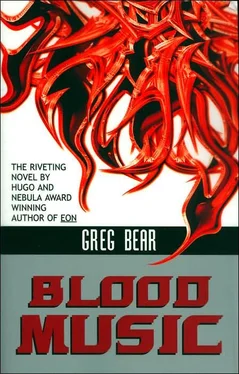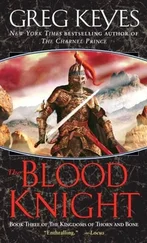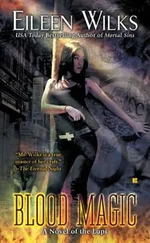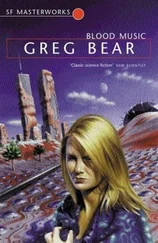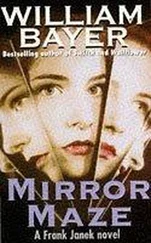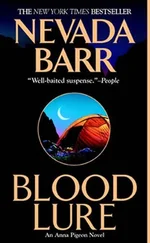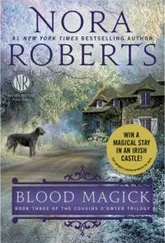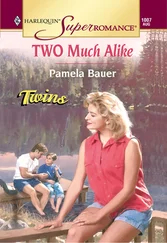Gregory Bear - Blood Music
Здесь есть возможность читать онлайн «Gregory Bear - Blood Music» весь текст электронной книги совершенно бесплатно (целиком полную версию без сокращений). В некоторых случаях можно слушать аудио, скачать через торрент в формате fb2 и присутствует краткое содержание. Город: New York, Год выпуска: 2005, ISBN: 2005, Издательство: ibooks, Incorporated, Жанр: Фантастика и фэнтези, на английском языке. Описание произведения, (предисловие) а так же отзывы посетителей доступны на портале библиотеки ЛибКат.
- Название:Blood Music
- Автор:
- Издательство:ibooks, Incorporated
- Жанр:
- Год:2005
- Город:New York
- ISBN:1596871067
- Рейтинг книги:4 / 5. Голосов: 1
-
Избранное:Добавить в избранное
- Отзывы:
-
Ваша оценка:
- 80
- 1
- 2
- 3
- 4
- 5
Blood Music: краткое содержание, описание и аннотация
Предлагаем к чтению аннотацию, описание, краткое содержание или предисловие (зависит от того, что написал сам автор книги «Blood Music»). Если вы не нашли необходимую информацию о книге — напишите в комментариях, мы постараемся отыскать её.
Blood Music — читать онлайн бесплатно полную книгу (весь текст) целиком
Ниже представлен текст книги, разбитый по страницам. Система сохранения места последней прочитанной страницы, позволяет с удобством читать онлайн бесплатно книгу «Blood Music», без необходимости каждый раз заново искать на чём Вы остановились. Поставьте закладку, и сможете в любой момент перейти на страницу, на которой закончили чтение.
Интервал:
Закладка:
He thought, as they drove back across the bridge, In other circumstances, I’m sure we’d fall in love with each other. I’m positive we’d be married in a few years. She’s terrific—and I’m not going to do anything about it. The sensation he felt at this was sad and romantic and altogether wonderful.
He knew that if he pressed her, she would probably come up to his apartment with him, and they would make love.
Even though he hated and despised being a virgin, he would not press her. He would not even suggest it. This was too perfect.
They sat in the ‘vette outside the converted old mansion where she lodged and discussed Kennedy, laughed about their fears during the missile crisis, and then held hands and just looked at each other.
“You know,” he said quietly, “there are times when…” He stopped.
“Thank you,” she said. “I just thought you would be good on a date. Most men, you know—”
“Yeah. Well, that’s me.” He grinned. “Harmless.”
“Oh, no. Not harmless. Not in the least.”
Now was the turning point. It could go one way, or the other. He flashed on her olive-colored body and knew it was smoothly, youthfully perfect. He knew that she would go with him to his apartment.
“You’re a romantic, aren’t you?” she said.
“I suppose I am.”
“I am too. The silliest people in the world are romantics.”
He felt heat in his face and neck. “I love women,” he said. “I love the way they talk and move. They’re enchanting.” He was going to open up now, and regret it later, but what he felt was too true and undeniable, especially after this evening. “I think most men should feel a woman is, like, sacred. Not on a pedestal, that sort of thing. But just too beautiful for words. To be loved by a woman, and—That would just be incredible.”
Olivia looked through the windshield, a smile flickering on her face. Then she looked down at her purse and smoothed her calf-length blue dress with her hands. “It’ll happen,” she said.
“Yeah, sure.” He nodded. But not between us.
“Thank you,” she said again. He held her hand, and then reached up to caress her cheek. She rubbed against his hand like a kitten and tugged on the door handle. “See you in class.”
They hadn’t even kissed.
–What has happened to me since? Three wives—the third because she looked like Olivia—and this distancing, this standing apart. I have lost far too many illusions.
There are options,
–I don’t understand.
What would you wish to revise?
–If you mean go back, I don’t see how.
It is all possible here, in Thought Universe. Simulations. Reconstructions from your memory.
–I could live out another life?
When there is time.
–With the real Olivia? She… where was she, is she?
That is not known.
–Then I’ll pass. I am not interested in dreams.
There are more memories within you.
–Yes…
But where did they fit, where did they come from?
Randall Bernard, twenty-four, had wed Tiffany Marnier on the seventeenth of November, 1943, in a small Kansas City church. She wore a silver-beaded silk and white lace gown that her mother had worn for her wedding, no veil, and the flowers had been blood-red roses. They had—
They sipped a cup of wine between them and exchanged their vows and broke a piece of bread and the minister, a Theosophist who would by the end of the 1940s be a Vedantist, pronounced them equal in the eyes of the Deity, and now united by love and common regard.
The memory was tinted, like an old photograph, and not good on details. But it was there and he hadn’t even been born, and he was seeing it, and then seeing their wedding night, marveling in the quick glimpses of his own creation and how so little had changed between man and woman, marveling at his mother’s passion and pleasure, and his father’s doctorly, precise, knowing skill, even in bed a doctor—
And his father went off to war, serving as a corpsman in Europe, moving with Patton’s U.S. Third Army through the Ardennes and crossing the Rhine near Coblenz—sixty-five miles in three days—and his son watched what he could not possibly have seen. And then he watched what his father could not possibly have seen:
A soldier in plus-fours stepping into the dark, dank hallway of a brothel in Paris; not his father, not anybody he knew—
Very dim, but clear in outline, a woman rocking a child in orange sunlight coming through an isinglass window—
A man fishing with cormorants in a gray early morning river—
A child staring out of a barn loft at a circle of men in the yard below, slaughtering a huge black and white wide-eyed bullock—
Men and women doffing their long white robes and swimming in a muddy river surrounded by red stone bluffs—
A man standing on a cliff, horn bow in hand, watching a herd of antelopes cross a hazy grass plain—
A woman giving birth in a dark underground place, lit by tallow lamps, watched by smeared, anxious faces—
Two old men arguing about impressed balls of clay in a circle drawn in sand—
–I don’t remember these things. They aren’t me, I didn’t experience them—
He broke free of the flow of information. With both hands, he reached up to red-glowing circles over his head, so warm and attractive. —Where did they come from? He touched the circles and felt the answer in his hundred-cell body.
Not all memory comes from an individual’s life.
–Where, then?
Memory is stored in neurons—interactive memory, carried in charge and potential, then downloaded to chemical storage in cells, then downloaded to molecular level. Stored in introns of individual cells.
The insight was almost agonizing in its completeness and intensity.
Symbiotic bacteria and transfer virus—naturally occurring in all animals and specific for each species—are implanted with molecular memory transcribed from the intron. They exit the individual and pass on to another individual, ‘infect,’ transfer the memory to somatic cells. Some of the memories are then returned to chemical storage status, and a few return to active memory.
–Across generations?
Across millennia.
–The introns are not junk sequences…
No. They are highly condensed memory storage.
Vergil Ulam had not created biologic in cells out of nothing. He had stumbled across a natural function—the transfer of racial memory. He had altered a system already in existence.
–I do not care! No more revelations. No more insights. I’ve had enough. What happened to me? What did I become? What good is revelation when it’s wasted on a fool?
He was back in the framework of Thought Universe again. He looked around at the images, the symbolic sources of different branches of information, then at the rings over his head. They glowed green now.
You are DISTRESSED. Touch them.
He reached up and touched them again.
With a jerk, he stretched out into the interface and began to integrate with the macro-scale Bernard; up the tunnel of dissociation, into the warm darkness of the lab. It was night—or at least sleeping time.
He lay on his cot, barely able to move.
We can no longer hold your body form.
–What?
You will be withdrawn into our realm again soon, within two days. All your work in the macro-scale must be completed by that time.
–No…
We have no choice. We have held off long enough. We must transform.
“No! I’m not ready! This is too much!” He realized he was screaming and held both hands to his mouth.
He sat up on the edge of the cot, his grotesquely ridged face dripping sweat.
40
“Are you going to leave again? Just go away?” Suzy held on to Kenneth’s hand. He stopped before the elevator. The door opened.
Читать дальшеИнтервал:
Закладка:
Похожие книги на «Blood Music»
Представляем Вашему вниманию похожие книги на «Blood Music» списком для выбора. Мы отобрали схожую по названию и смыслу литературу в надежде предоставить читателям больше вариантов отыскать новые, интересные, ещё непрочитанные произведения.
Обсуждение, отзывы о книге «Blood Music» и просто собственные мнения читателей. Оставьте ваши комментарии, напишите, что Вы думаете о произведении, его смысле или главных героях. Укажите что конкретно понравилось, а что нет, и почему Вы так считаете.
